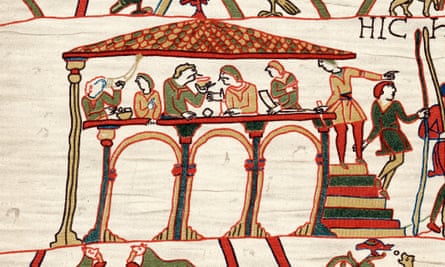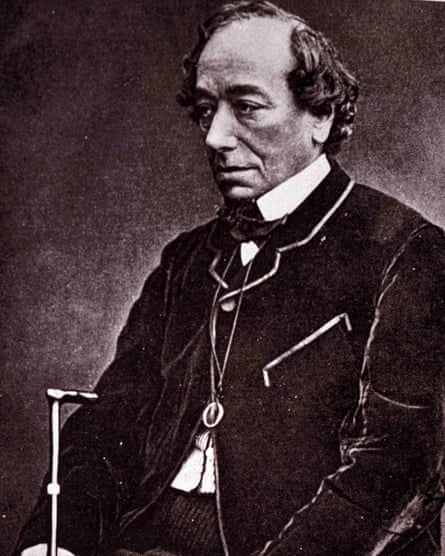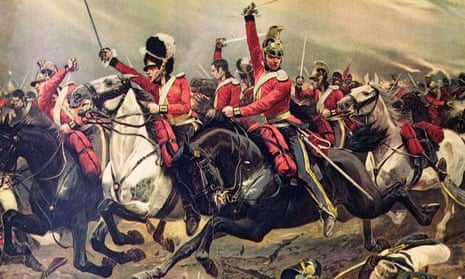55BC-409
Becoming Europeans
Julius Caesar’s offer for Britain to join Europe on Roman Republic terms is patriotically rebuffed. But the treacherous British elites have sniffed the international lifestyle of Rome, and are soon going there to hand over a small percentage of tribal GDP as offerings at the Capitol. By 43, they understand modern financial vehicles known as coins and are worth annexing by Emperor Claudius’s European superstate. Boadicea (despite probably not existing) tries to take back control, but the wheels come off her chariot, and for the next 350 years the Britons are ruled by a snappily toga-ed continental elite and their collaborators.
409-443
Brexit #1
The legions exit Britannia, to fight one another where it matters. Tired of taxation without defence, the Britons cry freedom and go it alone. But they are unable to obtain mutually acceptable bilateral trade deals with the Picts and Scots, who insist on their right to attack in coracles. So the Britons beg the Romans to let them back in. The Romans are too busy trying to hold the newly acceded Hungarians to European norms of behaviour, so the desperate Britons turn to some obscure Germans called the English, who record the approach thus: AD443 This year sent the Brit-Welsh to Rome & them assistance bade against the Picts, but they gave them none, for that they fought with Attila, King of the Huns, & then sent they to the English.
Anglo-Saxon Chronicle
The English agree to do the fighting in return for residency rights in the south-east. But they soon call over their dependants, swamp the Britons, and impose their own culture.
793-1042
Scandinavian Efta
By 790, the new England is closely aligned with Charlemagne’s Europe. Then freedom-loving Scandinavians swamp the north and east, and ultimately enable Cnut to make England part of his Danish empire. Three Danish kings are followed by Edward the Confessor (half-Norman) and Harold Godwinson (a half-Danish Wessex warlord, hated by everybody north of the Thames). It’s hard to work out what English sovereignty means.

1066
Reunion with Europe
William the Conqueror creates a new single market with northern France. Being English now means tending pigs, sheep and cows so that the French-speaking elite can feast on pork, mutton and beef. For the next 900 years, any monoglot Englishman is not quite comme il faut. And if you don’t understand that, well, it just goes to show.
1533
Brexit #2
Henry VIII wants a divorce, really, really badly; a would-be new elite wants to disrupt the Catholic church. They use cutting-edge German social-media technology – printing – to invent fake news: if England breaks with Rome, there will be a financial dividend for everyone, and a boost for the Tudor NHS.
‘Then shall these great yerely exaccions cease … Then shall we have ynough and more then shall suffice us, whiche shall be the best hospitall that ever was founded for us.’
Supplycacion for the Beggars (1528/9)
1689
Back into Europe
Brexit #2 plunges the British Isles into ferocious wars. At last, the desperate English invite the Dutch to invade and sort things out. So England gets a Dutch king who can barely speak English, then ceases to exist in 1707 when a new thing called Great Britain gets a German king who can barely speak English. But that’s fine because both kings, like the entire English elite, can speak French.
1815
Brexit #3
At Waterloo, the new United Kingdom fields 28,000 men, more than half of them Irish or Scottish, and beats Napoleon thanks to another 90,000 European soldiers. But being European is hard work, so we get out. Our exit strategy is brilliant: hand the wealthy industrial Rhineland to militarist Prussia – thus dooming the Danes, Poles, Austrians, French and pretty much everyone for the next 130 years.

1880
Brexit #4
Under Disraeli, the UK plays the game in Europe, becoming arbiter of the continent. But the first great populist, Gladstone, retreats from needless entanglements in Europe. For 20 years, everyone knows that France and Russia v Austria and Germany is coming, but we insist that we have no skin in the game. When it’s too late to stop the deluge, we at last plump for France and the ghastly dictatorship that is tsarist Russia.
1914-75
Two world wars and one sane act
Having won at appalling cost, we again pretend to be non-Europeans, until we have to join France and the ghastly dictatorship that is Stalinist Russia to do it all again 20 years later. But we can’t tell the difference between “we held out bravely until the bigger players turned the game around” (true) and “we won the second world war” (false), even though the Americans now clearly run the world and we clearly no longer have an empire.
Boldly facing down this national delusion, Edward Heath, backed by Margaret Thatcher, just beats Labour and the Powellites (’fraid so) and gets us into Europe again. In 1975, we agree by a very large majority to stay there.
2021
Ourselves, alone
Thatcher is kicked out by her own party for turning into an American libertarian. Her continuity army, “like some demented Marxist sect” (Douglas Hurd), unleashes cultural warfare against Europe because they hate maternity leave. The stout John Major sees off the “bastards” (his word), but the spineless David Cameron lets the “swivel-eyed loons” (his words) have their referendum. Abetted by tax-exile news proprietors, Trotskyite nutters, and the touching overconfidence of pro-Europeans in our collective sanity, the English National party, led by the popular comedy turn Boris “Merrie Monarch” Johnson, narrowly wins, then claims that a one-all draw (1975 v 2016) represents the eternal will of the English people, so the rest of us are traitors.
Next up
The United Kingdom dies and the English are alone again at last. Happy new year.
James Hawes’s latest book is The Shortest History of England
